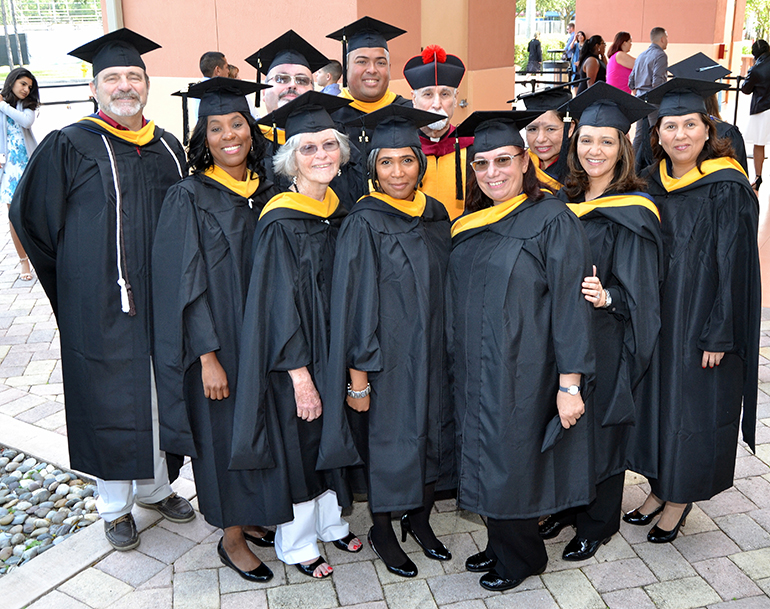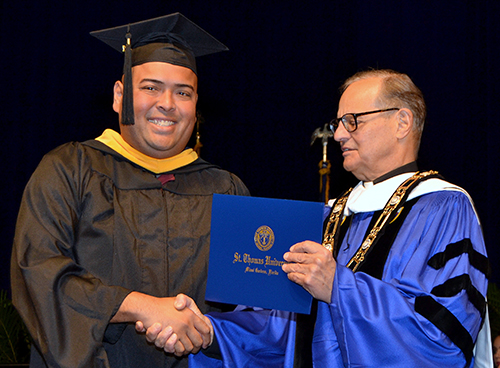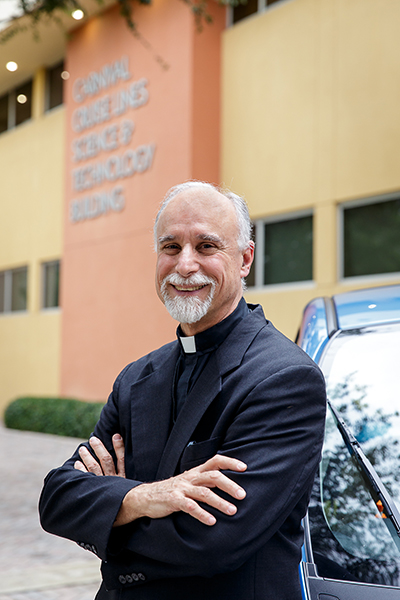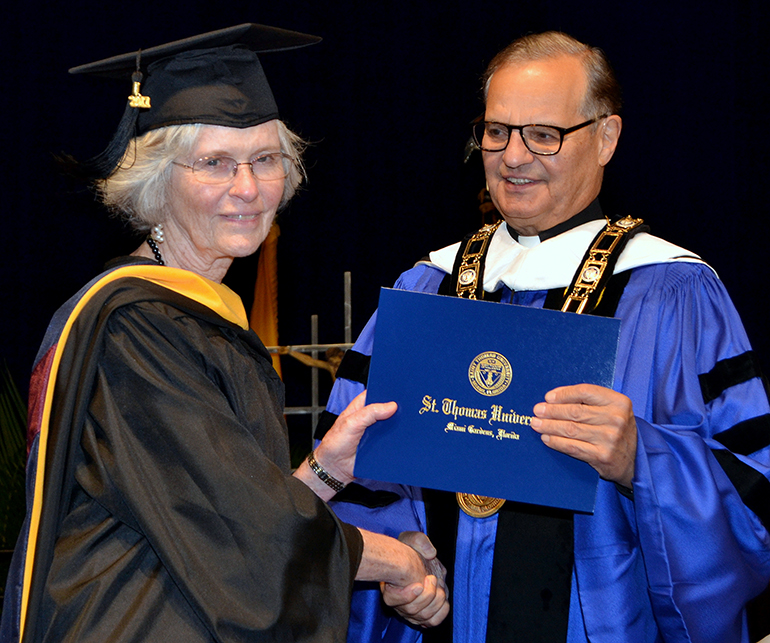Wednesday, January 3, 2018
Jim Davis - Florida Catholic

Photographer: JIM DAVIS | FC
The first 10 graduates of the master's program in bioethics pose before receiving their diplomas Dec. 16 at St. Thomas University. In the back, in the red-topped hat, is Father Alfred Cioffi, director of the program.
MIAMI GARDENS | Bioethics: The word may conjure images of goggled, lab-coated researchers bending over Petri dishes. But as the recent commencement at St. Thomas University showed, it can also draw interest from landscapers, doctors, even businessmen.
More than interest, actually. More like fiery enthusiasm.
“This should be required for everyone — priests, educators, anyone who brings the future to our people,” said Deacon Ed Wolff, one of the first 10 students to earn master’s degrees Dec. 16 in STU’s bioethics program. “We can’t have people sitting in the pews uninformed.”
Echoing his sentiments was Dr. Mary Jo O’Sullivan, a longtime ob/gyn doctor in the Miami area. “Omigod, I wish I’d had this 40 years ago. It’s hard to maintain religious perspectives in the medical field.”

Photographer: JIM DAVIS | FC
Antonino Santamarina receives his diploma in bioethics Dec. 16 from Msgr. Franklyn Casale, president of St. Thomas University.
The new bioethics program covers a huge amount of ground over its 15 months. Not only the usual abortion and assisted suicide but transgender issues, prenatal screening, global warming, genetically modified foods, even astrobioethics. (Who has the right to terraform another planet? Would it be whoever arrives first?)
Many other universities examine those issues, but STU grounds its studies in Catholic teachings, said Father Alfred Cioffi, director of the program.
“We do deep theological anthropology,” he said. “It gives a view of the human person: Who are we, why are we here, where did we come from, where are we going?”
He said the program stands on two “pillars.” One is ethical issues on human life. “We stand for the sanctity of human life, from conception to natural death.” That leads to a study of medical issues, like research and healthcare, with a primary value of benefiting people.
The other pillar of the bioethics program is preservation of the environment. “We are stewards of creation,” Father Cioffi said. “Of the two million species, humans are the only ones who can help or harm the environment.”
Father Cioffi himself embodies the dual priorities of the program. He holds two doctorates: one in moral theology from the Pontifical Gregorian University in Rome, the other in genetics from Purdue University in Indiana.
He holds the bioethics class on Saturday mornings, with a live lecture for those who can make it, teleconference for those who can’t. He even records and uploads each session to YouTube.
“There’s no excuse for missing a lecture,” he said.

Photographer: TOM TRACY | FC
Father Alfred Cioffi, director of the bioethics program at St. Thomas University.
The flexible format allows a variety of people to take the class. They include not only businessmen and landscapers but housewives, a nurse, an advocate for migrant workers — even two priests, from Miami and Tampa.
Patrick Noriega, one of the graduates, is currently an associate instructor in math and science at Miami-Dade College, but he plans to go on to medical school. He especially admired Father Cioffi’s program for applying the Ethical and Religious Directives of the United States Conference of Catholic Bishops.
“I liked how [the bioethics program] emphasized the life of every human being,” Noriega said. “We need to emphasize that each life is unique and essentially sacred.”
His classmate, Antonino Santamarina, felt the program sheds light on his profession with a credit union.
“When you make decisions, you should do a deeper analysis than the numbers,” Santamarina said. “It’s not just about profit or loss. It’s also balancing family and work. It’s about the human factor.”
Deacon Wolff lives in Palm Coast, but he made a point of taking STU’s bioethics program. He said he was alarmed over recent events — especially an experiment last year by the Salk Institute that patched together a human/pig embryo called a “chimera.”
As a result of his STU studies, Wolff said he emphasizes more human values in his job teaching fifth-grade math and science in a public school. He predicted the bioethics class is “going to make a big difference. And things are moving way too fast.”
In the bioethics program, Dr. O’Sullivan found confirmation as much as guidance. “What I thought was right, was confirmed, and empowered in this class,” she said. “Like in end-of-life situations — when is it right to stop treatment? Did I do the right thing? Now I know that you do everything you can, and then it’s in God’s hands.”
Retired from Jackson Memorial Hospital for 10 years, Dr. O’Sullivan is already applying her learning in two volunteer positions: pregnancy counseling with the archdiocese and with Heartbeat of Miami.
Even a horticulturist with a degree in chemistry, Gloria Espinosa, praised Father Cioffi’s program. She heard him on Radio Paz and decided to enroll.
“I love everything about this class,” she exclaimed, but her favorite parts were about protecting the environment. She is currently a landscape manager for the University of Miami, but she wants to get into research on climate change.
“As Catholics, we are to love our neighbors,” Espinosa said. “God gives us the planet to take care of it, not to destroy it. If we don’t stop the people who are killing us, who will?”
For his part, Father Cioffi says he will adjust the bioethics program continually as new technologies emerge. He expects news of more chimeras and other manipulation of life. And he foresees attempts by researchers to use taxpayer money.
Catholics will have to be among those who insist on leavening science with human values, he said.
“The rest of the world thinks in utilitarian terms — if they can do it,” Father Cioffi said. “The Catholic approach is whether we should do it. Whether we have sound reasons that preserve the dignity of human life.”
For now, he is “absolutely elated” with his first graduates. After 15 months of teaching and research — and after seeing their enthusiasm — he looks forward to seeing how they make their mark.
“I told them that it’s not called a graduation — it’s called a commencement because now they have to begin to apply what they’ve learned into their conversations, their families and friends and workplaces, whenever the issues come up,” he said. “And they will come up. They’re the experts now.”

Photographer: JIM DAVIS | FC
Dr. Mary Jo O'Sullivan receives her diploma in bioethics Dec. 16 from Msgr. Franklyn Casale, president of St. Thomas University.
Comments from readers